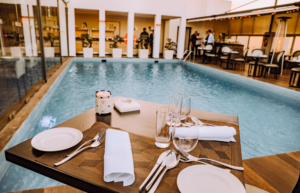Financing a Hotel Purchase

For first-time buyers, navigating the complexities of how to finance a hotel purchase can feel like an overwhelming challenge. With a myriad of lenders, diverse financing options, and the critical need for a solid repayment strategy, understanding the process is crucial.
At the Engine Room our years of expertise as hotel consultants has given us key insights, steps and considerations to ensure success.
While previous hospitality experience can make financing easier, exploring key aspects of hotel financing, delving into the varied financing options available will help you in building a robust financial plan.
What Is Hotel Financing?
Hotel financing refers to securing funding to purchase, build, or renovate a hotel property. Lenders provide tailored financial products to meet the needs of hotel businesses, ranging from large chains to boutique establishments. Each financing option will have its own set of criteria, repayment terms, and advantages. Therefore, it is vital to align your financing choice with your business’ specific goals.
Whether you will be acquiring an existing property or developing an entirely new venture, the financial planning process demands a comprehensive understanding of the funding landscape and your repayment capacity.
Types of Hotel Finance
A variety of financing solutions are available for purchasing or developing a hotel. Here’s a short breakdown of some of the most popular options:
Commercial Mortgage
A commercial mortgage is a common choice for financing a hotel purchase. These loans typically offer long repayment terms and lower interest rates, making them ideal for established businesses with a proven track record.
However, lenders will often require substantial documentation and personal guarantees.
Bridging Loan
If you need short-term funding to secure a property quickly, a bridging loan might be the answer. These loans are a fast, flexible option but come with higher interest rates. They are often used as a stopgap before securing more permanent financing.
Development Finance
For building or significantly refurbishing a hotel, development finance can provide the necessary capital. This type of funding is typically released in stages as construction progresses, ensuring the money is used efficiently.
Merchant Cash Advance
Now, for hotels already generating regular card sales, a merchant cash advance allows you to borrow against future revenue. Repayments are tied to your takings, this provides flexibility during quieter seasons.
Asset & Equipment Financing
When you need to purchase furniture, kitchen equipment, or technology, asset financing spreads the cost out over time. It’s a practical option for reducing upfront expenses while acquiring essential hotel assets.
Self-Funding
If you have sufficient personal savings or assets, self-funding a hotel purchase can give you complete control over the project and eliminate the need for interest payments. This approach carries significant financial risk.
Start-Up Loan
For first-time buyers or entrepreneurs, start-up loans from banks or specialised lenders are an option. These loans are usually smaller and come with higher interest rates due to the associated risks.
Government Grants
Certain government schemes provide grants or low-interest loans for businesses that support tourism or local employment. Researching these opportunities can lead you to uncover funding that aligns with your business goals.

Best Practices for Hotel Financing
By adopting the following best practices, you’ll know how to finance a hotel purchase successfully, enhance your chances of securing funding and building a profitable business.
1. Develop a Comprehensive Business Plan
A strong business plan is the cornerstone of any successful loan application. Include detailed information about your vision, market analysis, operational strategy, and financial forecasts. Lenders will scrutinise your plan to assess your business’s potential and repayment ability.
2. Conduct a SWOT Analysis
Analyse your business’s strengths, weaknesses, opportunities, and threats (SWOT) to understand your position in the market. A clear grasp of these factors demonstrates to lenders that you’re aware of challenges and are prepared to address them.
3. Create Detailed Business Projections
Present clear financial projections, including cash flow forecasts, profitability timelines, and expense management strategies. These financial models and figures should demonstrate how your hotel will generate enough revenue to meet repayment obligations.
4. Understand Hotel-Specific Metrics
Highlight the potential performance of the hotel property, including past occupancy rates, average daily rates, and guest revenue.
For new developments, provide detailed market research and forecasts to showcase the viability of the location and concept.
5. Structure Your Business Effectively
The way your business is structured can impact your funding options and tax obligations. Whether you operate as a sole trader, limited company, or partnership, ensure that your structure aligns with your financial and operational goals.

How the Engine Room Can Help Your You
Understanding how to finance a hotel purchase is an essential first step for aspiring hotel owners. With so many financing options available, it’s crucial to select the solution that best aligns with your goals and resources.
By developing a robust business plan, showcasing strong financial projections, and exploring all financing avenues, you can confidently approach lenders and investors. With the right preparation and support, securing funding for your dream hotel is well within reach.
For expert guidance on the financial factors or operational improvements of your hotel purchase or support with creating a winning business plan, contact our team today on 020 3960 5137 or enquiries@the-engineroom.co.uk.



